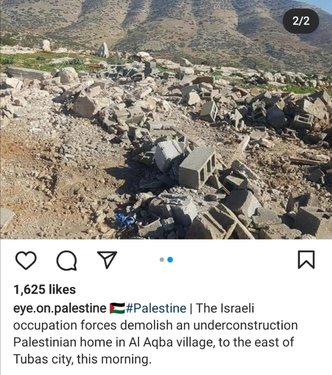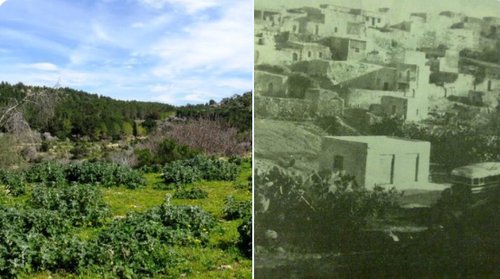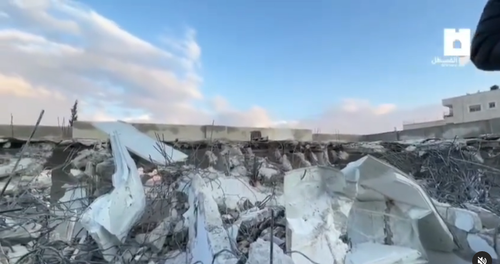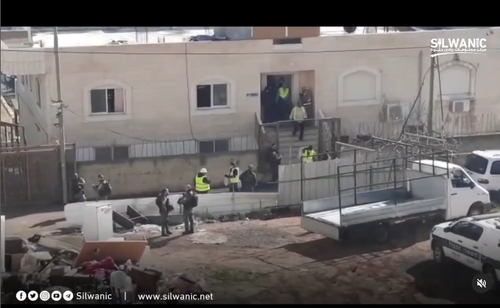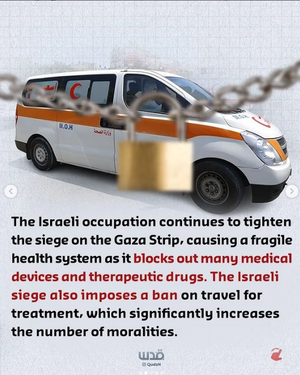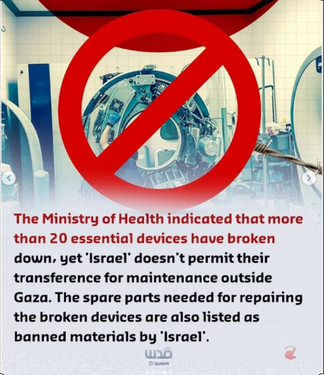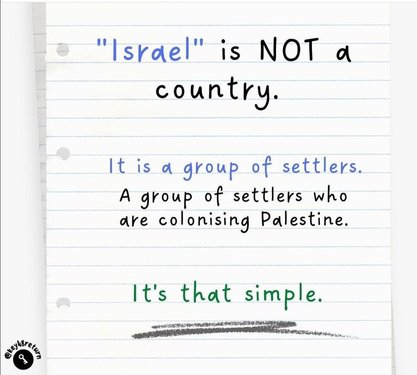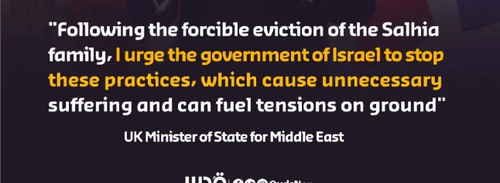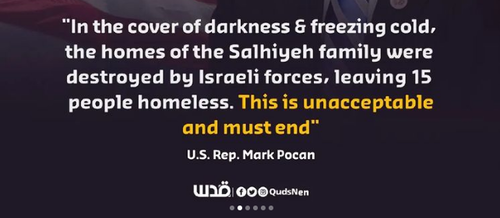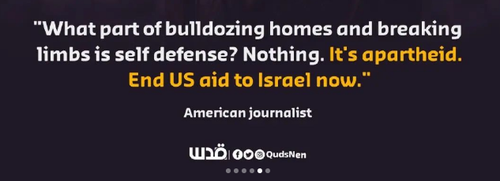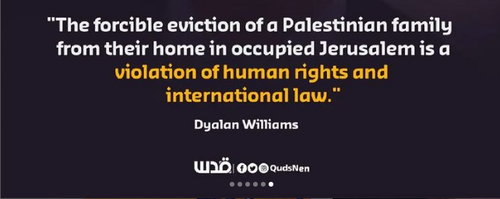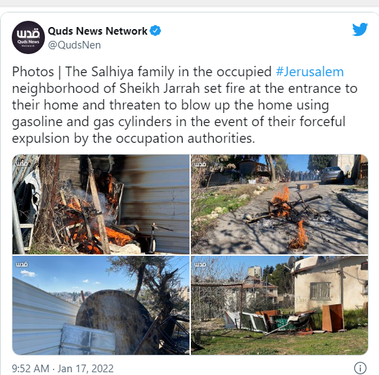-
Posts
8,434 -
Joined
-
Days Won
771
Content Type
Profiles
Forums
Events
Everything posted by ummtaalib
-
Amnesty International report accusing Israel of apartheid will cause attacks on Jews around the world — ADL claims News that Amnesty International will issue a report declaring Israel an apartheid state has caused outrage among Israel lobbyists, who see it as part of the tsunami of delegitimization that Israel's own leaders said it would face by refusing to grant Palestinians rights. The news is that Amnesty International is poised to issue a report tomorrow describing Israel as an apartheid state, thereby joining a list of other human rights organizations that reached the same conclusion in the last year, notably Human Rights Watch and B’Tselem — following Palestinian groups that documented the crime years ago. Source
-
How to Attain Khushuʿ 6: Persistently Ask Allah for Khushuʿ and Do Not Give Up Turn to Allah (‘azza wa jall) the Almighty with humility and beg Him to grant you the ability to perform your ṣalāh with khushūʿ. Have certainty in your heart that He will respond, as He so promised: “When My servants ask you about Me, truly I am near. I answer the call of the caller when he calls on Me; so let them respond to Me, and believe in Me, so that they may be guided” (2:186). You can make duʿā’ in your own language and ask Allah to bless you with khushūʿ. Alternatively, you may wish to memorise the following supplications of our beloved Messenger ﷺ and ask Allah (‘azza wa jall) through them: اَللّٰهُمَّ آتِ نَفْسِيْ تَقْوَاهَا ، وَزَكِّهَا أَنْتَ خَيْرُ مَنْ زَكَّاهَا ، أَنْتَ وَلِيُّهَا وَمَوْلَاهَا ، اَللّٰهُمَّ إِنِّىْ أَعُوْذُ بِكَ مِنْ عِلْمٍ لَّا يَنْفَعُ ، وَمِنْ قَلْبٍ لَّا يَخْشَعُ ، وَمِنْ نَّفْسٍ لَّا تَشْبَعُ ، وَمِنْ دَعْوَةٍ لَّا يُسْتَجَابُ لَهَا. O Allah grant my soul taqwā (piety and mindfulness) and purify it, for You are the Best of those who can purify it. You are its Protector and Master. O Allah, I seek Your protection from knowledge which does not benefit, a heart which does not submit, a soul which is not satisfied, and a supplication which is not accepted (Muslim). اَللّٰهُمَّ إِنِّيْ أَعُوْذُ بِكَ مِنْ صَلَاةٍ لَّا تَنْفَعُ. O Allah, I seek Your protection from a prayer which does not benefit (Abū Dāwūd). رَبِّ اجْعَلْنِيْ لَكَ شَكَّارًا ، لَكَ ذَكَّارًا ، لَكَ رَهَّابًا ، لَكَ مِطْوَاعًا ، إِلَيْكَ مُخْبِتًا أَوَّاهاً مُّنِيْبًا My Lord, make me one who is extremely grateful to You, who remembers you always, who perpetually fears You, who is fully obedient to You, who is humble before You, who constantly cries and pleads with You, and who frequently turns to You in repentance (Abū Dāwūd). اَللّٰهُمَّ أَعِنِّيْ عَلَىٰ ذِكْرِكَ ، وشُكْرِكَ ، وَحُسْنِ عِبَادَتِكَ. O Allah, help me to remember You, be grateful to You and worship You in an excellent manner (Abū Dāwūd). Never Give Up! Making the human lose hope is one of Shayṭān’s most powerful tricks. You might think: “This khushūʿ thing is not for me. I’ve tried it, but I keep getting distracted.” Do not give in to this trick and continue to try. On some days your level of khushūʿ will feel strong, whilst on others, you may not feel it at all. Despite all of this, continue to work on it and do not ever give up. Strive for a balance Achieving a balance is not always easy. Try to strike a balance between pushing yourself and over-doing it. Push yourself and fight your nafs to pray ṣalāh, working on both the quality and the quantity of your ṣalāh. At the same time, do not burden yourself with it so much that you find it challenging to maintain. For instance, you may attend an īmān-boosting lecture and therefore decide to get up an hour before Fajr to pray tahajjud. The first day or week may pass smoothly, but by the second week, you might start feeling like it is too much; you do not feel like waking up at all anymore, not even for 10 minutes. Rather than immersing yourself fully, build yourself up gradually over time. Try to be consistent as consistency is the key. The Messenger of Allah ﷺ said, “The best deeds in the sight of Allah are those which are constant, even if they are few” (Bukhārī). Accordingly, do not take an ‘all-or-nothing’ attitude. If your inner voice is saying, ‘Either I’m going to pray all of my voluntary prayers or none at all,’ then remember that it is better to pray some of them than to pray none of them.
-
Story of the Ethnic Cleansing of Yalu On this day 54 years ago, my family was ethnically cleansed from our village, Yalu. Israel violently erased us from our land, but never replaced us with settlers. It figures prominently in Israeli greenwashing campaigns. Our only crime was being in Israel's way. This is our story. During the 1948 Nakba, Zionist militias that later formed the Israeli army tried to conquer the Latrun villages (Yalu, Imwas, Bayt Nuba). Local resistance overpowered the Zionists' superior weaponry. My grandfather, an 18 year old orphan, was among those who defended our land. As Israel's Defense Minister in 1967, Moshe Dayan returned to Yalu, Imwas and Bayt Nuba with a personal vengeance due to the humiliating defeat that local resistance handed his battalion in 1948. He ordered the villages razed and its residents emptied. A Yalu elder was blind, and was crushed to death under the rubble of his own home in the 1967 conquest. He was unable to flee in time. I think of Israel's "warnings" to Palestinians of Gaza before they bomb their homes, giving them nowhere to seek shelter, when I think of him. Members of our extended family were missing for months. The people of Latrun were forced to move by foot towards either Ramallah or Jordan. My family ended up in Jordan. Each night, my grandfather would drive from refugee camp to refugee camp looking for his brother's family. Months. Months of your life go by, not knowing whether your family is living or dead. To this day, some members of my extended family still live in refugee camps. Any negotiated "peace" that excludes them is what Kanafani called a "conversation between the sword and the neck" Pieces of the homes remain. I love my great uncle. He doesn't say much, is quite stoic, has an acerbic wit. He's delivered some of the funniest one-liners I've ever heard. He wept when he recognized tile from his destroyed childhood home, visiting Yalu ~40 years after our Nakba. The villages of Yalu, Imwas and Bayt Nuba became "Canada Park," established by the Canadian Jewish National Fund. The US JNF has tax-exempt status while it attacks the grassroots justice movement that children of exile like myself helped grow. Canada Park is one of many examples of Israeli greenwashing, where it claims be environmentalist in order to obscure the settler-colonial violence its military used to empty Palestinian land, planting foreign trees in the place of razed Palestinian homes. https://pbs.twimg.com/media/E3UoXJPXMAUvkoJ?format=png&name=small Emile Habibi pointed to the absurdity of greenwashing in his 1974 novel "The Secret Life of Saeed: The Pessoptimist." The main character, a wise-fool, asked: "Was this why you demolished the Latrun villages, Imwas, Yalu, and Bait Nuba, and drove away their inhabitants, master?" We carry immense pain, just like the other 300,000 refugees of 1967, the 1948 Nakba refugees, and that of the people of Silwan and Sheikh Jarrah fighting settler-colonial erasure today. Their resistance today speaks to our stubborn refusal to abandon our liberation struggle. I was raised to know and love this land as if I had lived in Yalu myself. We are four generations living in exile. We plan to return together. Our elders did everything they could to spare us from the pain of dispossession, and we must honor their sacrifice by ending the Nakba. Hanna Alshaikh @yalawiya
-
Inhumane Israeli evictions and demolitions continue...The Karama family of Al-Tur town The crews of the occupation municipality evacuate a Palestinian home before demolish it, in Al Tur town in Jerusalem. All these fully armed Israeli soldiers were gathered to detain unarmed Palestine who was trying to defend his home from demolition by the Israeli occupation bulldozers in Al Tur town, today.Eye On Palestine (@eye.on.palestine) • Instagram photos and videos The Israeli occupation forces detained number of Palestinians after assaulting them while demolishing the demolition of Karama's family home in Al Tur town in Jerusalem. Eye On Palestine (@eye.on.palestine) • Instagram photos and videos A Palestinian child from the family of Karama hides behind the door of a car and blocks his ears during the demolition of his family home in Al Tur town, today. Eye On Palestine (@eye.on.palestine) • Instagram photos and videos The Israeli occupation forces attack journalists while covering the demolition of Karama family home in Jerusalem. Eye On Palestine (@eye.on.palestine) • Instagram photos and videos The rubble of Karama's family home which was demolished by the Israeli occupation authorities in Al Tur town in Jerusalem.
-

The Blessed Sunnah of Rasulullah ﷺ - Books
ummtaalib replied to ummtaalib's topic in Sunnah Practices
Beautiful Sunnah of Beloved Nabi Sualallahu Alaihe Wasallam By: Hazrat Maulana Shah Hakeem Muhammad Akhtar Saheb (rahmatullaahi 'alayhi) PDF -

The Blessed Sunnah of Rasulullah ﷺ - Books
ummtaalib replied to ummtaalib's topic in Sunnah Practices
The Blessed Sunnah of Rasulullah ﷺ - Volume 2 Download The Blessed Sunnah of Rasulullah ﷺ - Volume 3 Download -
The Blessed Sunnah of Rasulullah ﷺ - Volume 1 (Concise version) Jointly Published by: Wifāq ul Ulāma (SA) Madrasah Ta’leemuddeen, Isipingo Beach, Durban, South Africa Download
-
-
The Israeli occupation authorities demolish Al Araqeeb bedouin village in Al Naqab for the 197th time #savealnaqab
-
Reagrding the new facts Mohammed El-Kurd @m7mdkurd
-
New facts revelas massacre and mass grave of Plestinians New facts are being revealed about the heinous massacre of Tantura which was committed by Israeli occupation forces in 1948 New documentary revelas massacre and mass grave of PlestiniansThe documentary 'Tantura ' sheds new light on the massacre the of Palestinians after the conquest of Tantura village in 1948. The bodies of the villagers were buried in a mass grave. Via @trtworld Eye On Palestine on Instagram: "🇵🇸#Palestine | New documentary reveals massacre and mass grave of Palestinians. The documentary 'Tantura ' sheds new light on the massacre…"
-
The Israeli ambassador to the UN Gilad Erdan came to a Security Council meeting holding a rock to prove Palestinian "terror attacks with rocks". Eye On Palestine on Instagram: "🇵🇸#Palestine | The Israeli ambassador to the UN Gilad Erdan came to a Security Council meeting holding a rock to prove Palestinian "terror…"
-
Condemnation of Israeli forced expulsions Here is how representatives condemned the Israeli forced expulsion of the Palestinian family of Salhiya from Sheikh Jarrah neighborhood HRW's Communications Coordinator: "The forcible expulsion of the Salhiya family and demolition of their home in #SheikhJarrah are war crimes. This is what apartheid and persecution looks like. Perpetrators should be prosecuted & sanctioned."Human Rights Watch denounced on Wednesday Israel's demolition of Palestinian family house and forcibly displacing its 18 members, saying these are "war crimes" and "Perpetrators should be prosecuted and sanctioned." The British Consul General in Jerusalem, Diane Corner, joined on Monday other representatives of the European Union and like-minded countries to bear witness to the ongoing forced displacement of the Salhia family, who live and run a business opposite the British Consulate in East Jerusalem. Quds News Network (@qudsnen) • Instagram photos and videos
-
“They silenced it. It mustn’t be told; it could cause a whole scandal. I don’t want to talk about it, but it happened. What can you do? It happened."This is what the former Israeli soldier Moshe Diamant told the film director Alon Schwartz in a new documentary film that goes back to the affair of the Palestinian village #Tantura.Akevot’s researcher Adam Raz told Haaretz about the new testimonies about the battle of #Tantura, and about the code of silence among the soldiers who were there – and among all of us – that prevents any discussion about what happened.
-
How to Attain Khushuʿ 5: Increase Your Time in Private Worship Another means of attaining khushūʿ in ṣalāh is to engage in ʿibādah, especially in private. Just you and Allah (‘azza wa jall). No one else. You may perform many acts of ʿibādah, but still not experience their sweetness. Rectify this by increasing your private worship. Private worship is one of the best ways to attain sincerity and protect yourself from hypocrisy. Once your heart is purified, you will taste the sweetness of īmān and worship. Imām Mālik (raḥimahullāh) said, “Whoever would like to have peace in his heart, and be saved from the agonies of death and the terrors of the Day of Judgement, then let his private deeds be greater than his public ones.” The Nafs Loves Praise Our inner self (nafs) rages inside of us. It loves praise and hates criticism. Sometimes it insidiously manifests itself when we mention our private worship in casual conversation with someone. We must, however, fight this. We should avoid mentioning our private acts of worship and maintain it as a special ‘secret’ between us and Allah (‘azza wa jall). Sufyān al-Thawrī (raḥimahullāh) said, “When the servant performs a deed in private, Shayṭān keeps at him until he mentions it. It then moves from the records of private deeds to the record of public deeds.” However, this does not mean that every deed should be done only in private. On the contrary, numerous deeds have to be performed communally and, therefore, in public. Nevertheless, we should strive to have a collection of ‘secret deeds,’ deeds that no one has knowledge of but Allah (‘azza wa jall). Be careful of ʿujb Conducting deeds in private may seem like an act that is free from risks. It is not, and you should be careful of your nafs. Just like you ought to be wary of riyā’ (showing off) when you worship Allah in public, you should be wary of ʿujb (self-admiration) when you worship Allah in private. ʿUjb is to be impressed with yourself and your feats. ʿUjb can lead to pride (kibr). This pride can lead to you comparing your actions to others, and start regarding your deeds to be better than theirs. You may, as a result, start looking down on them. Consequently, instead of purifying the soul, your private deeds lead to the destruction of the soul.
-
Introduction For quite a while, very deceiving tactics have been utilised by the non-Madhhabīs (also known as Salafiyyah) over the past few decades to lure people into their sect. The most prominent of these tactics is to have the unsuspecting public thinking that having differences of opinion in matters of fiqh is dangerous and something unfounded within the parameters of our dīn. The general public are given questions by the non-Madhhabīs to cause doubts in their minds. These questions range from ‘how can four schools (madhhabs) be correct?’ to questions like ‘how can four different opinions be right? Isn’t our Prophet j one?’ They also propagate that there must be one way in all matters of jurisprudence (fiqh). However these people of innovation (bidʿah) conceal, or are ignorant of their own scholars who themselves have differed in fiqh. The following is a compilation of a range of issues where the Salafī scholars have differed among themselves in just the description of prayer (ṣalāh) itself. Venturing beyond the scope of differences in ṣalāh will, by far, be too lengthy and time consuming for this short epistle; hence, it has been limited to the prayer itself. This is because there are a lot of scholarly differences that can be accumulated between them (adding other differences from other chapters besides the description of prayer). However, the intention is to give the intrigued reader the upshot of this essay and an insight regarding the differences that have occurred between the Salafī scholars. الاختلاف في صفة الصلاة بين علماء السلفية The Differences in the Description of Prayer between the Salafī Scholars May I remind the readers that the intent of this short work is to show that Muslims can never be unified under one opinion in all aspects relating to the religion; differences will occur in our jurisprudence (fiqh), and that the scholars will always differ down to the grain. Classical scholars have always agreed on a principle that differences amongst the scholars is a mercy from Allāh (subhana wa ta’ala). To proceed with the differences: [1] Folding the Hands after Bowing (Rukūʿ) – Qawmah a) Sh. al-Albānī’s opinion that placing your hands back after rukūʿ is a misguided innovation (bidʿah ḍalālah): ولست أشك في أن وضع اليدين على الصدر في هذا القيام ( يعني بعد الرفع من الركوع) بدعة ضلالة، لأنه لم يرد مطلقا في شيء من أحاديث الصلاة وما أكثرها، ولا ذكره أحد من أئمة الحديث فيما أعلم “I have no doubt that placing the two hands upon the chest in this standing (i.e. standing after rukūʿ) is a misleading bidʿah (innovation in religion), because this was not mentioned at all in any of the h̩adīths on [describing] ṣalāh though they are numerous. This was not mentioned by any of the scholars of h̩adīth as far as I know.”([1]) b) While Sh. Ibn Bāz was of the opinion that it was from the Sunnah: ينبغي أن يعلم أن ما تقدم من البحث في قبض الشمال باليمين ووضعهما على الصدر أو غيره قبل الركوع وبعده كل ذلك من قبيل السنن “It should be known that the above discussion on holding the left hand with the right one and placing them both on the chest, or any other place, either before or after rukūʿ is an act of Sunnah.”([2]) [2] Constantly Moving Finger in Tashahhud a) Sh. Ibn ʿUthaymīn was of the opinion that the finger should be moved constantly in tashahhud with the duʿāʾ, utilising the narration containing the narrator Zāʾidah Ibn Qudāmah: دلت السنة على أنه يشير بها عند الدعاء، لأن لفظ الحديث «يحركها يدعو بها» فكلّما دعوت حرِّكْ “The sunnah indicates that he should point with it when supplicating (duʿāʾ̃), because the h̩adīth reads, ‘moving it, making du’ã with it’. So every time you make duʿāʾ̃ (in tashahhud), move your finger.”([3]) b) Sh. Muqbil Ibn Hādī al-Wādiʿī , utilising ʿAbdullāh Ibn Zubayr’s narration, says: هذا الحديث يدل على الإشارة بالأصبع، وأما التحريك فقد تفرد به زائدة بن قدامة، وقد خالف أربعة عشر راوياً “This h̩adīth proves the indication (ishārah) with the finger, as for moving it then Zāʾidah Ibn Qudāmah is alone in his narration. He has opposed fourteen narrators.” He goes on to reject the narration of Zāʾidah Ibn Qudāmah, saying it is isolated (shādhdh).([4]) [3] Placing the Knees on the Ground before the Hands during Sujūd a) Ibn Bāz , while discussing the ah̩ādīth regarding the knees going first before the hands during the prostrations (sujūd), says: وهذا هو الأصح والأرجح، وبذلك يتفق الأحاديث ولا يقع بينها خلا ف. النهي عن البروك كبروك البعير يوافق حديث وائل في تقديم الركبتين، ثم اليدين بعد ذلك في السجود “And this is the most correct and likely opinion, for that is in agreement with the ah̩ādīth and there is no difference between them. For the prohibition of kneeling like that of the camel is in agreement with the h̩adīth of Wāʾil regarding the knees going first [for sujūd], thereafter the hands after that during the sujūd.”([5]) b) However, Sh. al-Albānī mentions to do the opposite: الخرور إلى السجود على اليدين… كان يضع يديه على الأرض قبل ركبتيه “Going Down into Sujūd with the Hands: He used to place his hands on the ground before his knees.”([6]) [4] Joining the Feet/Ankles in Prayer (Ṣalāh) a) Sh. al-Albānī was of the opinion that joining the feet in prayer is from the authentic Sunnah: ولكن ربما يخفى على الكثيرين منهم أن من إقامة الصف تسويته بالأقـدام، وليس فقط بالمناكب، بل لقد سمعنا مراراً من بعض أئمة المساجد -حين يأمرون بالتسوية- التنبيه على أن السنة فيها إنما هي بالمناكب فقط دون الأقدام ولما كان ذلك خلاف الثابت في السنة الصحيحة، رأيت أنه لابد من ذكر ما ورد فيه من الحديث؛ تذكيراً لمن أراد أن يعمل بما صح من السنة؛ غير مغتر بالعادات والتقاليد الفاشية في الأمة “However, it remains unknown to many that straightening the rows requires straightening it with the feet, not just the shoulders. Indeed, we have often heard some of the Imāms of the mosques (masājid) pointing out – when ordering the people to straighten the rows – that the Sunnah is to do so with the shoulders to the exclusion of the feet! Since this is contrary to what is established in the authentic Sunnah, I thought it necessary to mention some ah̩ādīth that exist on this topic, as a reminder for whoever wishes to act in accordance with the authentic Sunnah, not being deceived by the widespread customs and habits prevalent in the Ummah.”([7]) b) Contrary to this position, Sh. Ibn ʿUthaymīn mentions the feet should not be joined throughout prayer (ṣalāh) and said to do so is extreme: وليس معنى ذلك أن يلازم هذا الإلصاق ويبقى ملازماً له في جميع الصلاة. ومن الغلو في هذه المسألة ما يفعله بعض الناس من كونه يلصق كعبه بكعب صاحبه ويفتح قدميه فيما بينهما حتى يكون بينه وبين جاره في المناكب فرجة فيخالف السنة في ذلك، والمقصود أن المناكب والأكعب تتساوى “It does not mean that he should continue this joining and remain so for the whole s̩alāh. From the extremism that has occurred with regard to this issue is what is done by some people in that one of them will join his ankle to the ankle of his companion, and he will spread his feet so far apart until there is a gap between his shoulder and the shoulder of his companion, so he will oppose the Sunnah by doing that. The aim is that the shoulders and ankles should be in line with each other.”([8]) [5] Where to Place the Hands in Prayer (Ṣalāh) a) Sh. al-Albānī vehemently advocates the view that the hands should be placed on the chest in prayer: وضعهما على الصدر هو الذي ثبت في السنة، وخلافه إما ضعيف أو لا أصل له “Placing the hands on the chest is what is established in the Sunnah, and any other opinion besides this is either weak or has no basis.”([9]) b) However, according to Sh. S̩ālih̩ al-Fawzān , other opinions are also regarded as Sunnah: سنن الأفعال …وضعهما على الصدر أو تحت السرة في حال القيام “Sunnah actions: and (he should) place both his hands upon the chest or below the navel in the standing posture.”([10]) [6] To say ‘al-Salām ʿalā ’l-Nabī’ or ‘al-Salām ʿalayka ayyuhā ’l-Nabī’ in al-Tah̩iyyāt a) Sh. S̩ālih̩ al-Munajjid, who supervises the question and answer website, Islamqa, said after quoting the ḥadīth of Ibn Masʿūd (ra) stating that after the death of Nabī (sallallahu alaihi wa sallam) they said ‘al-Salām ʿalā ’l-Nabī’: وهذا أثبت ألفاظ التشهد وأحسنها عند العلماء “This is the soundest version of the wording of the tashahhud according to the scholars.”([11]) b) However, Sh. Ibn ʿUthaymīn says this is from the ijtihād of Ibn Masʿūd (ra), and that ‘al-Salām ʿalayka ayyuhā ’l-Nabī’ should be said: وأمّا ما وَرَدَ في صحيح البخاري عن عبد الله بن مسعود h أنهم كانوا يقولون بعد وفاة الرسول ﷺ: «السَّلامُ على النَّبيِّ ورحمة الله وبركاته» فهذا مِن اجتهاداتِه h التي خالَفه فيها مَنْ هو أعلمُ منه؛ عُمرُ بن الخطَّاب h، فإنه خَطَبَ النَّاسَ على مِنبر رسول الله ﷺ وقال في التشهُّدِ: «السَّلامُ عليك أيُّها النبيُّ ورحمة الله» كما رواه مالك في «الموطأ» بسَنَدٍ من أصحِّ الأسانيد، وقاله عُمرُ بمحضر الصَّحابة j وأقرُّوه على ذلك “As for what is narrated in Ṣaḥīḥ al-Bukhārī from Ibn Masʿūd (ra), that they used to say ‘al-Salām ʿalā ’l-Nabī’ after the Prophet’s (sallallahu alaihi wa sallam) demise, this is from his ijtihād, in which someone more learned than him, ʿUmar Ibn al-Khaṭṭāb (ra) differed with him. ʿUmar (ra) used to give sermons on the minbar of the Prophet (sallallahu alaihi wa sallam) and he used to say in the tashahhud: ‘al-Salām ʿalayka ayyuhā ’l-Nabī’, as narrated by Imām Mālik in his Muwat̩t̩aʾ with a very authentic chain, and ʿUmar h did this in the presence of many Ṣah̩ābah (raa), and they all agreed with him.”([12]) [7] Reciting al-Fātih̩ah in the Loud (Jahrī) Prayers behind the Imām a) Sh. S̩ālih̩ al-Fawzān mentions three opinions, of which he agrees with the third opinion that it is only obligatory to recite Sūrat al-Fātih̩ah behind the Imām in the quiet prayers: القول الثالث: التفصيل، في الصلاة السرية تجب؛ أما في الجهرية فيستمع لقراءة إمامه، لقوله تعالى: ﴿ وَإِذَا قُرِئَ ٱلۡقُرۡءَانُ فَٱسۡتَمِعُواْ لَهُۥ وَأَنصِتُواْ لَعَلَّكُمۡ تُرۡحَمُونَ ٢٠٤ ﴾ وهذا هو الراجح، وهو اختيار شيخ الإسلام ومذهب الإمام مالك، هو الراجح إن شاء الله لأنه تجتمع به الأدلة أن المأموم يجب عليه قراءة الفاتحة في الصلاة السرية الظهر و العصر، ولا يقرأ في الصلاة الجهرية والإمام يقرأ “The third opinion: specifically, in the quiet (sirrī) prayers it is obligatory [to recite Sūrat al-Fātih̩ah]; as for the loud prayers, then he should listen to the recitation of his Imām, as Allāh says: ‘When the Qurʾān is being recited, listen attentively and remain silent so that you may receive mercy’. This is the correct opinion, and it was also the preferred view of Shaykh al-Islām Ibn Taymiyyah and in accordance with the School of Imām Mālik. It is the correct opinion, InShāʾAllāh, because it combines all the proofs: like it is obligatory upon the follower to recite al-Fātih̩ah in the quiet prayers like Ẓuhr and ʿAṣr, and that he should not recite in the loud prayer while the Imām is reciting.”([13]) b) However, the standing committee of Saudi for research and fatwā said it is obligatory to recite al-Fātih̩ah in both quiet and loud prayers: الصحيح من أقوال أهل العلم وجوب قراءة الفاتحة في الصلاة على المنفرد والإمام والمأموم في الصلاة الجهرية والسرية “The correct opinion from amongst the people of knowledge is that it is obligatory to recite al-Fātih̩ah in the prayer for both the munfarid [one praying alone], Imām, and follower, in the loud and quiet prayers.”([14]) Conclusion By the grace of Allāh (subhana wa ta’ala), the above should be more than sufficient to prove the point. The many examples are regarding the differences amongst Salafī scholars in matters related to just prayer alone. The above gives overwhelming proof that differences are inevitable; this is despite the many other scholars from their group who have been left out from this discussion, as well as other issues of differences they have between themselves besides prayer, such as ablution (wuḍūʾ), bathing (ghusl) and even issues relating to Ḥajj and Ṣawm etc. Final Note May I remind the readers who are looking for the truth that sincerity is important: although we want to act upon the most correct view (in accordance with the Qurʾān and the Sunnah), most of the times our sincerity is severely lacking, harbouring pride (takabbur) or even looking down upon others, because we think they are not acting upon the truth – which will, in essence, damage any good actions we may strive to do. والله تعالى أعلم وصلى الله تعالى على سيدنا محمد وعلى آله وصحبه أجمعين Compiled by – Abu Humayd —————————————————————————————————- ([1]) S̩ifah S̩alāt al-Nabī, Nās̩ir al-Dīn al-Albānī, p. 145. ([2]) Fatāwā Ibn Bāz, ʿAbd al-ʿAzīz Ibn Bāz, vol. 11 p. 142. ([3]) Al-Sharh̩ al-Mumtiʿ, S̩ālih̩ Ibn ʿUthaymīn, vol. 1 p. 594. ([4]) Al-Jāmiʿ al-S̩ah̩iḥ, Muqbil Ibn Hādī, vol. 2 p. 121. ([5]) Nūr ʿalā ’l-Darb, ʿAbd al-ʿAzīz Ibn Bāz, online ref: http://www.binbaz.org.sa/mat/14936. ([6]) S̩ifah S̩alāt al-Nabī, Nās̩ir al-Dīn al-Albānī, p. 139. ([7]) Silsilat al-Ah̩ādīth al-Ṣaḥīḥah, Nās̩ir al-Dīn al-Albānī, vol. 1 pp. 70-74. ([8]) Fatāwā Arkān al-Islām, S̩ālih̩ Ibn ʿUthaymīn, vol. 1 p. 312. ([9]) S̩ifah S̩alāt al-Nabī, Nās̩ir al-Dīn al-Albānī, p. 88. ([10]) Al-Mulakhkhas̩ al-Fiqhī, S̩ālih̩ al-Fawzān, vol. 1 p. 134. ([11]) S̩ālih̩ al-Munajjid, online ref: http://islamqa.info/ar/11417. ([12]) Al-Sharh̩ al-Mumtiʿ, S̩ālih̩ Ibn ʿUthaymīn, vol. 1 p. 150. ([13]) S̩ālih̩ al-Fawzān, transcribed from the following Q&A session available from his website, online ref: http://www.alfawzan.af.org.sa/node/12731. ([14]) Fatāwā al-Lajnah al-Dāʾimah, vol. 6 p. 384. darultahqiq
-
At 3 Am, Hundreds of Israeli occupation forces besieged Sheikh Jarrah neighborhood in Jerusalem, attacked the home of Salhiya family, detained its owners and others and demolished the home.
-
UK should be saying, stop because its ethnic cleansing, its wrong, its illegal, its a crime against humanity?!! And just this one family because there is an outcry? What about the rest of palestine being ethnically cleansed?
-
Details of the forced eviction in Sheikh Jarrah (Jerusalem) A Palestinian man, whose family is facing imminent eviction, threatened to set off gas canisters on the roof of his home on Monday in the Sheikh Jarrah neighbourhood in occupied East Jerusalem, rather than let Israeli forces force them out.Dozens of Israeli police officers stormed the home of the Salhiya family, where 40 people live, ordering them to evacuate their property.Some family members refused to obey the Israeli police order and barricaded themselves on the roof with gas canisters, while a team of Israeli negotiators attempted to convince them to come down.Israeli media reported that Mahmoud Salhiya had threatened to set himself on fire if the eviction order was carried out. "We've been in this home since the 1950s," said Salhiya family member Abdallah Ikermawi from the roof of the home."We don't have anywhere to go," he said in quotes provided by the Sheikh Jarrah Committee organisation.Sheikh Jarrah has been a significant flashpoint over the past year, after Israel tried to expel Palestinian families from the area last May to make way for Israeli settlers.The events had led to widespread protests in the occupied West Bank and Israel's mixed cities of Arabs and Jews, and a large-scale military operation in the besieged Gaza Strip.Israeli forces on Monday prevented activists from entering the area, located north of Jerusalem's Old City, leaving the Salhiyas to face the eviction order alone.Meanwhile, Instagram blocked Palestinian activist Muna el-Kurd from live streaming Israeli forces preparing to expel the family from their home to her 1.6 million followers.
-
Occupied Jerusalem (QNN) - The Dutch government has called on Israeli occupation authorities to “immediately” stop its forced displacement of a Palestinian family from its house in Sheikh Jarrah neighbirhood in East Jerusalem. “Ongoing attempt to evict a Palestinian family from their East Jerusalem home is contrary to international law and risks further escalation,” tweeted, Hans Docter, the Dutch ambassador to ‘Israel’. The Dutch ambassador added, “calls on the Israeli authorities to stop the eviction immediately.” Source The European Union: "[Israeli] evictions and demolitions are illegal under international law and significantly undermine the prospects for peace as well as fuel tensions on the ground."



